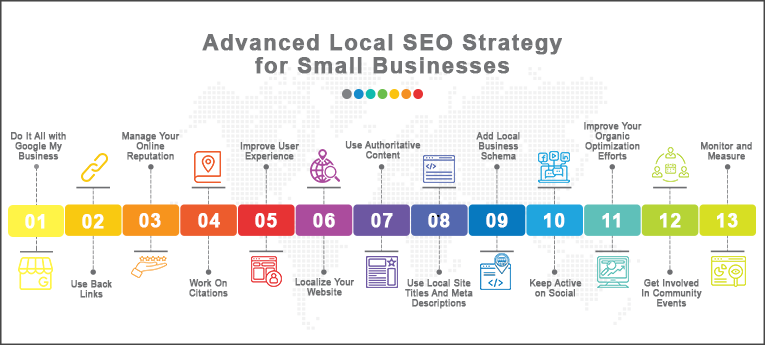Small businesses need to rise to the occasion of optimizing their local search strategy. There is more to local SEO strategy than what you’re already doing for your overall SEO tactics. Here we offer advanced local SEO strategies that help raise your rankings so local customers find you.

Do It All with Google My Business
It all begins with Google My Business. This free tool provides all the information local customers need to decide whether your business will resolve their issues. Whether they have an urge for tacos or need a special tool to make an urgent repair at their home, Google designed this tool to help their users find what they need for their “near me” searches. These searches are key to your success as users make these searches just before they make a purchase or plan a visit to a local establishment.
You need to claim your free Google My Business profile by setting it up and completing all of the features they offer. You can then optimize your profile using keywords adding photos and video, and making sure your contact information is correct. This address should then be consistent wherever your contact info appears online including industry listings, your website and social media. You also have the opportunity to make Google posts to showcase your offers or make announcements on a regular basis.
Use Back Links
High-quality links help boost local rankings. You should focus on local news, community and industry sites to see the best results. One of the best ways to get high-quality backlinks is to get involved with the community. This way your business name will be mentioned naturally on local charity sites, community event items and more. You need locally relevant content that gives you good reason to work with local newspapers and media outlets to share your news. You might also want to look for influencers to partner with to share links.
Manage Your Online Reputation
Customer reviews are important for obvious reasons. What customers have to say about a brand, products, customer service, ease of use, etc. all offer a strong reason for customers to opt to choose a brand, or not. Online reviews make it far too easy for your competitors to outshine you, and now also outrank you on Google searches. You need to concentrate some of your marketing efforts on reputation management both encouraging more reviews, as well as engaging conversations for negative reviews you come across.
This takes an effective process that creates reviews and manages comments so you both boost local search while improving your image. Looking at review and ranking is a key step in consumer decision-making, so you want to make sure they feel safe making that final step. Make sure you encourage reviews on Google My Business whether it is sending them an email once they complete their transaction, or providing instructions with a link to help them make a review easily. Then to manage your reputation have someone responsible for quick responses to reviews both positive and negative. Show gratitude for positive reviews and make it clear negative reviews are heard and efforts to make things right are being taken. This is also your chance to take heed of complaints to improve your customer service.
Work On Citations
Citations are nothing more than the appearance of your contact information online. Citations are in both obvious areas such as your website and social media and less obvious areas such as online industry listings and community listings. Your goal is to make sure every citation is consistent right down to the (.) next to Rd. or Ave. Your name, address, and phone number appear in several places online and must be exactly the same or else it interferes with your local SEO rankings.
It can also be very confusing for customers trying to find you. As mentioned above, Google My Business is like your base contact info, so use this as your template for all other contact mentions. This can be a very time-consuming process so you might want to use a service to do it for you.
Improve User Experience
Just think about your own personal searches and what you expect from the sites you visit. You, like everyone else, want to have an easy user experience. You want to find a website that you can view easily on your mobile phone with pages that load easily without any wait time. You want efficiency and so do your customers and prospects. Keeping in mind back in 2018 Google made it easy for anyone who will listen to understand they will be considering mobile-friendliness in their ranking criteria; this is a no-brainer for your SEO efforts.
Your pages need to load instantly, and you also want people to have easy scrolling and a burger menu they can see at the top of the page for easy navigation. Some factors that contribute to slow loading pages include large image size, and page redirects. Optimize image file sizes and check your site for redirects to improve loading speeds. The most important images are the ones “above the fold” which refers to the information appearing at the top of the page.
If this image fails to load within a few seconds, you’ll lose your visitor. You want them to take in this first image instantly, so they don’t get frustrated and go elsewhere. Google’s open-source AMP markup for mobile will help with user experience.
Localize Your Website
Localization starts with your full address on your website and then incorporates geo keywords that tie in with your titles and page content. You can make your address work harder by including it at the bottom of your website pages throughout the entire site. This is also convenient for your visitors. If you have more than one location it gets more complicated as you want to rank for each location in each specific town or street. Having a page with each location and the complete addresses and anything specific to that location helps. Whether you have single or multiple locations, you need to include localization in your marketing strategy. Include your location in your content headings and sub-headings when possible and consider repeating repurposed versions of the same blog or web pages for each location.
Use Authoritative Content
Your content needs to showcase your expertise. Locally focused content is an extension of that expertise while providing a bigger punch to your overall content strategy. It is one of the best ways to positively impact your local rankings as you become more credible in Google’s eyes.
Local content also helps you have more ideas for your editorial calendar. It’s easy to burn out on ideas early on, so this offers a new vein of subject matter. Get more involved in community events, subscribe to local newsletters and publications, find out what is important to local businesses, partner with non-competitive businesses to create interesting content, etc.
Use Local Site Titles And Meta Descriptions
Meta descriptions are important to local SEO as they are the snippet of info that appears on the search results. This is your chance to grab some attention, so people see you are worthy of a click. Create unique meta descriptions of about 160 characters relevant to each of your main keywords. Combine these efforts with optimized page titles using local keywords and search phrases and make sure there aren’t any duplicate titles on your site. Aim for titles of about 60 characters.
Add Local Business Schema
Structured data uses Schema Markup code to provide the information search engines need to learn quickly about your business. It is the language search engines understand allowing them to find your info and present it in a way users understand. These tags draw attention to search engines so you become relevant for related searches. There are Structured Markup tools that make it easy for you, showing you the code you need so you can apply it to your site.
Keep Active on Social
Social media helps establish your relevance, confirm your location and improve prominence for your online presence. Google considers these three factors as part of its local search criteria. Prominence is very important and includes links to and from your site. It can be basic things like links from listings but becomes even better when you can get mentioned on other authoritative sites with links to your site.
Intriguing posts on social media is the easiest way to get people to notice you, reposting your information and creating a buzz. You not only want to nurture customer relationships but also gain attention from local posts and other companies who might become interested in things such as cross-promotions or having you write guest blogs and vice versa. Within the industry, you might also encourage quotes or partnerships.
Improve Your Organic Optimization Efforts
Organic optimization helps you rank higher, but takes more time to perfect. It works across all search engines, not just Google. This falls back to creating a strong foundation with Google My Business, making sure you appear on all relevant local listings and doing your best to set yourself as a local authority in your industry.
Organic optimization is your ticket to the top ranking for organic results sitting below the local search results and ads. Savvy users know these are the spots to click as no money has been exchanged to pay for the privilege of sitting front and center. It helps drive more traffic to your site and is all about consistency, quality content, and a site that is quick to load to improve user experience.
Get Involved
You’ve probably noticed a pattern here with the mention of community. If you can become more involved in community events, you can draw more attention to yourself and help increase the odds of getting mentioned in local papers, as well as local charities. Sponsor a team, participate in charities, adopt a pet, make donations, etc. and you can really raise your profile as a local business that cares.
Host holiday events or food drives to attract people to your business and gain more followers on your social. It all works together to create an ongoing story that continues to feed your local SEO efforts. Don’t forget to join local business associations as well, as they will have opportunities for you to participate in local events, as well as things such as conferences and seminars where you can feature your industry expertise.
Monitor and Measure
You’ll be more successful if you make an effort to continue to monitor and measure your success. All your hard work won’t be worth much if you don’t continue to improve what you do and how you do it. Measure, monitor, adjust and repeat is the basic recipe to your local SEO success. Your competitors are doing it, which is why they continue to outrank you. So keeping up with their efforts means keeping up with monitoring which you can do using a local rank tracker.

Also, record web traffic volumes and compare them to in-store visits to help determine why people chose you. A special offer can help you follow what online efforts are seeing results, and the best place to do this is using your Google My Business post feature. Make sure the offer is unique to the posts, so you know for sure that is how people found you. Adjusting to make your strategy work better for you is the best way to stay one step ahead of the competition. A local grid tracker is another great tool as it shows you rankings on a map so you can assess your keywords and search proximity.
Your local search visibility sends people your way. Since local searches sit at the top of the rankings you want to have a local SEO strategy that allows you to fill those coveted top spots. The larger your local area, the harder you have to try to beat out the competitors. But even if you’re the only game in town never underestimate the importance of a sound local SEO plan.
We’re in the business of growing your business! We would be happy to work with you on your digital marketing strategy.
